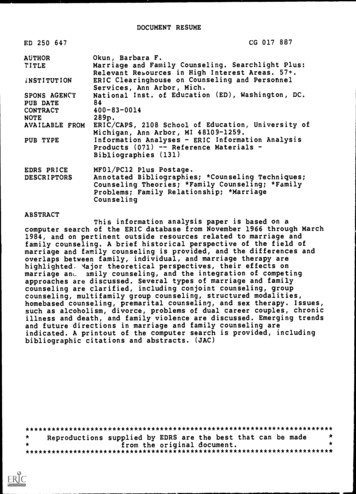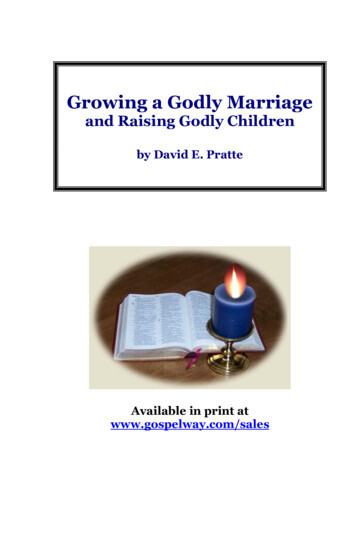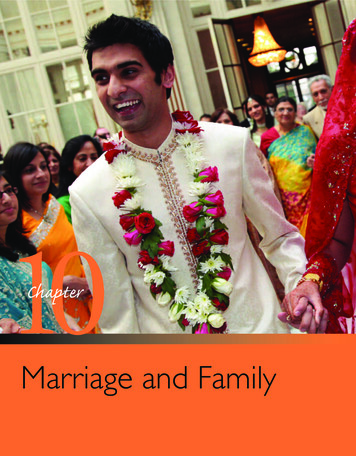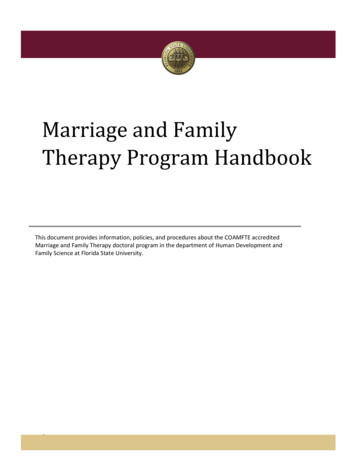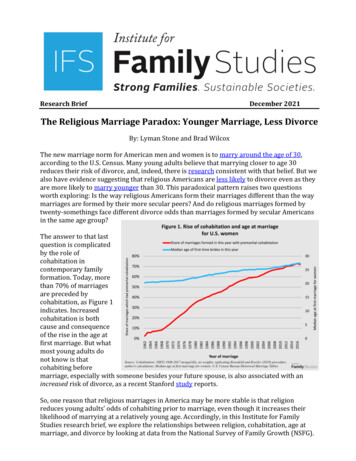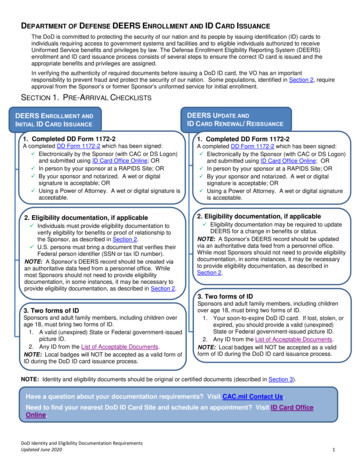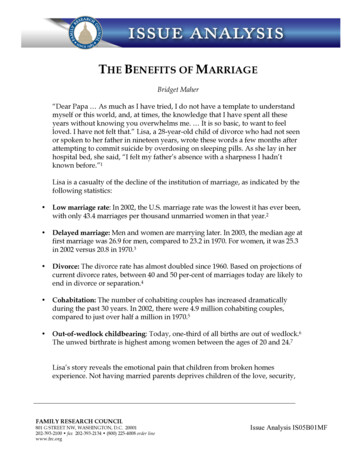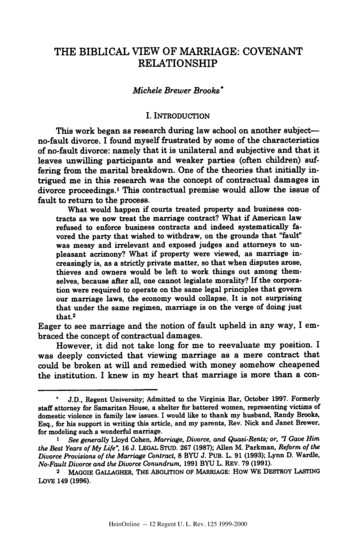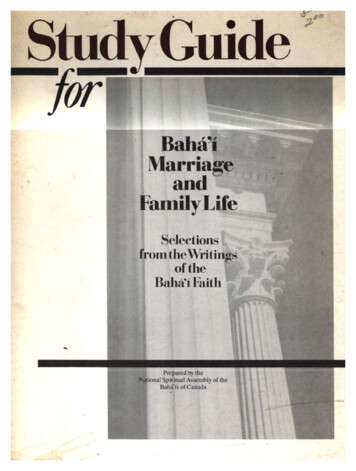
Transcription
Baha'iMarriageandFamily LifeSelectionsfrom theWritingsoft lieBaha’i FaithPrepared by theNational Spiritual Assembly of theBahd’is o f Canada
Prepared by:The National Spiritual Assemblyof the Bahà’is of CanadaCopyright 1986 by theNational Spiritual Assemblyof the Bahà’is of CanadaISBN 0-88867-060-5Printed in Canada
The following study guide is a companion to the compilation Bahďí Marriage andFamily Life. It suggests one possible approach to our examination of the teachingsrelated to Bahà’i marriage.The National Spiritual Assembly invites believers not only to use this material as it ispresented, but also to revise and adapt it to suit the needs and circumstances of thegroup studying the material.Because study materials are continually being revised, please forward to the NationalCentre any observations, suggested changes or recommendations.
Table of ContentsIntroduction.1Guidance for Group Study.2Section ISection IIThe Institution of MarriageALaw of Marriage. 4BCommitments and Responsibilities.6CThe Marriage Ceremony.9DMarriage as the Basis for Unity.11EAttitude Towards Divorce. 14FSex in Marriage. 16Preparation for MarriageASelf-knowledge.18BChoosing a Marriage Partner. 23C-D -E Chastity, Parental Consent, Engagement. 27Section IIIFamily LifeALove and Unity. 30BCommunication.32CTests and Difficulties. 33DEquality of Men and Women.34EEducation of Children. 35FRelationships within the Family. 36GDeath. 37HWork and Finance. 38
IHospitality. 39JRelationship with Bahá'1 InstitutionsandCommunity.40KFamily Life and Bahà’i Service.41Case Studies. 42Summary of Quotations. 48Appendix I: Extracts from letters of the Guardian andthe Universal House of Justice onbirth control.55Appendix II: Extract from a letter of the UniversalHouse of Justice on the relationships of husbands and wives. 57
INTRODUCTIONThe general goal of this Study Guide as stated in the introduction of the compilation Baha’iMarriage and Family Life is to help individualsunderstand the Bahà’i Writings related to marriageprepare for marriagewho are already marriedimprove family lifeand to assist Bahà’i Local Spiritual Assemblies in their educational and counsellingresponsibilities.A study of this compilation is intended to increase the knowledge and understanding of theindividual and will do this by helping toa)focus on developing personal spiritual qualities in order to fulfill one’s owncontribution to marriageb)focus on those qualities to be considered when choosing a marriage partnerc)know the legal requirements of Bahà’i marriaged)better understand the role of marriage as the foundation for a new social ordere)know those qualities of Bahà’i marriage which create unity between the husband andwife, among children and extended family.1
GUIDANCE FOR STUDYThis Study Guide can be used both by individuals and groups in various ways. Somesuggestions are:a)Individual study - Set aside a regular period of time each week to study a section.Use a notebook to jot down thoughts and at the end of each lesson include asummary of what you have learned and how this is useful to you in your own life.Think also about sharing it with others.b)Group study - Set regular study times with clear time limits, and ask for acommitment to all the sessions. For groups (e.g. institutes, seminars, summer schoolcourses) of 20 or more participants, divide into groups of 5 to 8 and choose groupleaders to guide the sessions.Motivation to use this study guide:Why should people use this guide in addition to reading through the compilation? It is easierfor most people to delve deeply into the Writings when a search is being made in answer to aspecific question. This study guide leads one through the compilation in this manner.Additional Guidelines:It is important for the group to discuss the following in order to create anticipation for whatis to be learned:a)How much time should be spent on this deepening? It will vary according to thelearners’ interest and the time available to the participants and instructor, but atthe outset, clearly outline the general time frame (i.e. week-end, one evening everythree weeks, and specifics such as Monday nights from 7 - 1 0 p.m.)b)How is the material to be studied? Divide the material into sections? Assign onegroup discussion leader for each segment? Assign the same section to all groups?What are the duties of the leader?1.Thoroughly prepare by studying material (compilation and study guide) in detail.2.Decide, in consultation with the participants, what specific knowledge should beattained by the participants. Individuals and couples can be encouraged to set theirown learning goals.3.Explore how this goal will be achieved. In responding to the Creative Word, peopleneed the framework that will draw out a holistic and appropriate response, uniqueto their own marriages and life situations. One of the most effective ways toaccomplish this can be done by simply reading questions and quotations, thenanswering the questions before turning to the "possible answers" page. Anotheroption is to put each question on a card and have participants choose their ownquestions. It is suggested that participants record their answers individually before2
discussion begins, in order to encourage individual expression of opinion. Thequestions naturally stimulate discussion, and other methods such as role playing ordemonstrations can be used when applicable.4.Materials required:Compilation: Bahďí Marriage and Family LifeStudy Guide on Bahá’1 Marriage and Family LifeNotebook and pen5.It is important for the discussion leaders and/or co-ordinators to meet togetherbeforehand to go over content, timing and procedure, as well as to allow time todebrief after each session. The discussion leader/coordinator is to be a facilitator,not a director, of the learning process, exhibiting flexibility as the study sessionprogresses. Success will depend upon the extent to which the conditions of Bahà’iconsultation are present.6.Frequently, either before or at the end of each lesson, review the major pointsdiscussed.7.Evaluate each session in terms of the objectives.8.For your convenience, a check list has been placed at the top of each section ofthe study guide.9.Case studies have been included in some sections to help the participants apply theprinciples they have been studying. They can be used as a role play or as a basisfor discussion.3
SECTION I: THE INSTITUTION OF MARRIAGECHECKLIST A:SET GOALS FOR LEARNINGREAD WRITINGS AHEAD OF TIMECONSULT ON THE WRITINGSSUMMARIZE MAJOR POINTSEVALUATE WHAT WAS LEARNEDLaw of MarriageRead the section entitled "Law of Marriage" and answer the following questions:1.Is marriage a command that is binding on every individual? Explain.2.If, as Shoghi Effendi states, marriage is not the central purpose of life, what is?3.There are benefits that always come from obedience to the laws of God. BaháVlláhenjoins us to marry as a means to establish order in the world and as an assistanceto ourselves.Based on the Writings and on your own knowledge and experience,a)How does marriage benefit society?b) How does marriage benefit the individual?4.Celibacy requirements for monks, priests, and nuns imply the notion that God canbest be served by people who are not married. How is that different fromBahà’u’ilàh’s teachings?5.Many people today believe that "living together" is far better for society and theindividual than getting married and planning to stay married. How would youconvince them that marriage is necessary for the well-being of mankind?Case StudySee p. 42 (I-A) for a situation designed to assist in the understanding and applicationof the Writings in this section.«4
SECTION I: THE INSTITUTION OF MARRIAGEA:Law of MarriagePossible Answers1.No. Although it is every person’s "moral duty to marry", it is "by no means anobligation".2.The following quotations from BaháVlláh serve to illustrate the central purpose oflife. (Of course, there are many more quotations which are also appropriate.)".Thou hast created me to know Thee and to worship Thee."Noonday prayer"The purpose of God in creating man hath been, and will ever be, to enable himto know His Creator and to attain His Presence."Gleanings from the Writings o f Bahà’u’llàh, p. 70"Whatever duty Thou has prescribed unto Thy servants of extolling to the utmostThy Majesty and Thy glory is but a token of Thy grace unto them, that theymay be enabled to ascend unto the station conferred upon their own inmostbeing, the station of the knowledge of their own selves."Gleanings, pp. 4-53.Possible answers might includeBenefits to SOCIETYmarriage provides for continuation of the human racesince the family is the basic unit of society, marriage helps create order insocietymarriage provides a secure place for the nurturing and training of childrenif we follow the command to "bring forth one who will remember God", we willbe assisting in the creation of a society which is attuned to its Creator.Benefits to the INDIVIDUALmarriage is, ideally, a source of love, encouragement and supportmarriage can act as a catalyst for the improvement of one’s spiritual lifeit can provide the opportunity for one to become and have a loving companionand friend.4.Bahà’u’ilàh’s exhortation to the priests and monks to marry and "bring forth one whowill make mention of God" implies that the rearing of children who will know andlove God is a greater service to God and humanity than being secluded from theworld.5
SECTION I: THE INSTITUTION OF MARRIAGECHECKLIST B:SET GOALS FOR LEARNINGREAD WRITINGS AHEAD OF TIMECONSULT ON THE WRITINGSSUMMARIZE MAJOR POINTSEVALUATE WHAT WAS LEARNEDCommitments and ResponsibilitiesRead the section entitled "Commitments and Responsibilities" and answer the followingquestions:1.According to the passages in this section, Bahá’1 marriage could be defined asfollows:a)a commitment of two people, one to the otherb)c)(List at least two more.)2.What is the purpose of Bahà’i marriage? See passages 6, 8, 10.3.‘Abdu’l-Bahà states that "Baha’i marriage is the commitment of two parties one tothe other." Define commitment. Why is that an important element in a marriage?4.‘Abdu’l-Bahá describes the relationshipanother: "They are two helpmates, twoabout the welfare of each other." Herelationship are "contentment, bliss anda)husband and wife should have with oneintimate friends who should be concernedpromises that the rewards of thispeace of heart."Describe how you feel when someone helps you.b) What are some ways that a helping relationship between husband and wife couldbe developed?5.Read passage #10.Study the following definitions:Procreate - - t o produce childrenVitiate — to make ineffective or worthlessa) Who set forth the primary purpose of marriage?6
b) Are there any limitations to the use of birth control?c)Since it is permissible to limit the number of children in a marriage, how woulda husband and wife go about deciding how many children to have, and whatwould be some of their considerations?Case StudySee p. 42 (I-B) for a situation designed to assist in the understanding and application ofthe Writings in this section.-7
SECTION I: THE INSTITUTION OF MARRIAGEB:Commitments and ResponsibilitiesPossible Answers1.A definition of Baha’i marriage could include:-a commitment of two peoplemutual attachment of mind and heartunion - both physical and spiritualan eternal union of spirits.2.The purpose of Bahà’i marriage is two-fold. The first purpose is "to become lovingcompanions and comrades and at one with each other for time and eternity." Thesecond is "the procreation of children."3.Commitment: An act of entrusting. An agreement or pledge to do something in thefuture. Commitment ensures security.4.Some of the ways of developing a helping relationship might include-5.consultationnegotiationconcentrating on the correction of one’s own faultsattempting to be selfless and generousconsidering the other’s needs as priority.BaháVlláh stated the primary purpose of marriage as the procreation of children.Birth control should not be used to produce a childless marriage.Discussion.Answers can also be found in the following sources: Extracts from the Letters of theGuardian and the Universal House of Justice on Birth Control and Related Subjects (seeAppendix I, pp. 55-56) and Lights o f Guidance, quotations 695-704, pp. 260-264.8
SECTION I: THE INSTITUTION OF MARRIAGECHECKLIST C:SET GOALS FOR LEARNINGREAD WRITINGS AHEAD OF TIMECONSULT ON THE WRITINGSSUMMARIZE MAJOR POINTSEVALUATE WHAT WAS LEARNEDThe Marriage CeremonyRead the section entitled "The Marriage Ceremony" and answer the following questions:C:1.In order for a Bahà’i marriage to be valid, what conditions must be met?2.Bahà’i marriage vows require each party to promise to "abide by the Will of God."How does this statement help spouses to set priorities?3.Scott and Elaine Parker became Bahà’is three months after their marriage. Theywould love to have a Bahà’i marriage ceremony. Please advise them.4.Except for the phrase "We will all verily abide by the Will of God", Bahà’i marriageceremonies are not all alike. Why? What guidelines should be kept in mind whenplanning a Bahà’i ceremony?The Marriage CeremonyPossible Answers1.To be valid, these conditions must be met:a)The Local Spiritual Assembly must officiate and appoint two witnesses. Seepassages 13, 18b) If there are two ceremonies, both must take place within 24 hours of oneanother. See passages 16, 17c)Consummation should take place within 24 hours of marriage or cohabitationshould begin with the intention of setting up a family relationship. See #19d) The legal requirements of the state/province must be met.2.One possible result of this vow is that it encourages spouses to go to the Writingsto discover their responsibilities. It also encourages them to continue living a Bahà’ilife.3.See #21.9
4.Beyond the obligation of the vows, BaháVlláh has given freedom to arrange themarriage ceremony in a way that is meaningful and pleasing to the couple beingmarried. There is no uniform mold and marriages often reflect the culture(s) of theindividuals involved. However, Shoghi Effendi states that the "ceremony itself mustbe simple."t10
SECTION I: THE INSTITUTION OF MARRIAGECHECKLIST D:SET GOALS FOR LEARNINGREAD WRITINGS AHEAD OF TIMECONSULT ON THE WRITINGSSUMMARIZE MAJOR POINTSEVALUATE WHAT WAS LEARNEDMarriage as the Basis for UnityRead the section entitled "Marriage as the Basis for Unity" and answer the followingquestions:1.Read passage #22. According to BaháVlláh, what is the main purpose of religion?How does marriage reflect this purpose?2.There are two processes occurring at all times in life: the process of disintegrationor breakdown and separation, and the process of union.a)In terms of the development of one’s spiritual self, how can disintegration beseen in a positive light?b) What comes from the union of created things?3.According to ‘Abdu’l-Bahá, marriage of Bahà’is should be the union ofa)b)If it is, what does He say the results will be?4.In passage #25, ‘Abdu’l-Bahá says that "when any souls grow to be true believersthey will attain a spiritual relationship with one another.and that union of theirs,that connection, will also abide forever."a)Why do you think He chose the word "grow"?b) If we are all in the process of growing to be true believers, how would thataffect the way we relate to and treat one another (including our spouses)?c)5.What is His definition of a "true believer"? Explain it in your own words.In passage #26, ‘Abdu’l-Bahá states that the tie between husband and wife is the"Word of God".a)What does He say are the results of this tie?11
b) What are some ways that the Word of God could be used "to cause them tobecome the signs of harmony and unity until the end of time"? In other words,how can the Word of God be used to promote unity between husband and wife?Case StudySee p. 44 (III-A) for a situation designed to assist in the understanding and applicationof the Writings in this section.12
SECTION I: THE INSTITUTION OF MARRIAGED:Marriage as the Basis for UnityPossible Answers1.The fundamental purpose of religion as defined by BaháVlláh is to "safeguard theinterests and promote the unity of the human race, and to foster the spirit of loveand fellowship amongst men."The institution of marriage reflects this purpose in that it safeguards theperpetuation of the human race, provides a secure environment for the rearing ofchildren, establishes the basic unit of harmony in society, and when entered throughthe love of God, causes a "wave of tenderness to be cast on the shore of life."2.a)When disintegration involves the dissolution of personality traits that hamperspiritual growth and the sense of harmony with those around you, then it ispositive in as much as it serves to free one from the material self.b) From the union of created things comes:- Divine bounties- life itself- eternal life- tenderness3.A) bodyB) soulIf the union is spiritual as well as physical, then it will last forever. #254.a) The word "grow" is a process word, implying that time is involved in change.He may have chosen it to reassure us that God has patience with us.b) Perhaps we should have patience with ourselves and with others as we strive toattain human perfections.c) ‘Abdu’l Bahá states:".Souls, that is, who will1.consign their own selves to oblivion2.strip from themselves the defects of human kind3.unchain themselves from human bondage."5.A) The results of this tie:"multitudes to assemble," "remote ones to be united," "the appearance of divinebounties," and "children who are born in the cradle of the love of God."b) -Daily prayers of husband and wife togetherObedience to the lawsPraying for one anotherDeepening togetherBahà’i service13
SECTION I: THE INSTITUTION OF MARRIAGECHECKLIST E:SET GOALS FOR LEARNINGREAD WRITINGS AHEAD OF TIMECONSULT ON THE WRITINGSSUMMARIZE MAJOR POINTSEVALUATE WHAT WAS LEARNEDAttitude Towards DivorceRead the section entitled "Divorce" and answer the following questions:1.Read passages 28, 29, 34, 35a) What are the conditions mentioned under which divorce can be considered?b) Define "aversion".2.In passages 28, 29, and 31, conditions are mentioned which should not be used asconditions for divorce. What are they?3.What and why is the year of patience?4.What is the attitude of the Faith toward divorce? Use quotations to back up youranswer.5.A decision to divorce is one not to be taken lightly. Many factors must beconsidered, including the effects of the divorce. In view of the Writings on divorce,what are some of the factors that should be considered?6.Study passages 28, 30, 32, 36. What are the responsibilities of the Local Assemblytoward troubled marriages and divorce?7.For discussion:What do you think are some of the factors contributing to the high rate of divorceamong North American Bahà’is?Based on the Writings, what are some possible remedies for each factor?Case StudySee p. 42 (I-E) for a situation designed to assist in the understanding and application ofthe Writings in this section.14
SECTION I: THE INSTITUTION OF MARRIAGEE:Attitude Towards DivorcePossible answers1.2.Divorce can be considered under the following circumstances:a.- "aversion" (‘Abdu’l Bahá)- "in exceptional circumstances, and when grave issues are involved"(Shoghi Effendi)- "only under rare and urgent circumstances" (Shoghi Effendi)- "only under exceptional and unbearable circumstances" (Shoghi Effendi)b.- aversion extreme dislike or disinclination: repugnance.The following conditions should not be used as grounds for divorce:-slight friction or displeasure #28no physical attraction #28sexual disharmony and incompatibility #29love for another person besides one’s spouse #29service to the Cause hindered by one’s spouse #313.The year of patience is a one-year period granted to an estranged couple duringwhich husband and wife are physically separated and have separate living quarters.Its purpose is to give the couple time to work on re-establishing harmony.4.Shoghi Effendi used the following words to describe the attitude of the Faith towarddivorce:-5."reprehensible act" #29"discouraged, deprecated, and against the good pleasure of God" #30"strongly condemns it" #33"should be avoided most strictly" #34"a last resort, to be avoided at all costs if possible and not to be lightlygranted" #37Some factors to weigh in considering divorce area) the impact of divorce on children #s 33, 35, 36b) consequences of the divorce on the life of each partner #28, and #35 (2nd part)c) impact of the divorce on the community (Kingdom of God) #286.Responsibilities of the Local Spiritual Assembly:a)b)c)d)e)f)circulate Writings about divorce #30monitor the year of patience #28investigate each case to decide if there are grounds for divorce #30serve as counsel and help #36try to preserve the family #32give final approval (or disapproval) of the divorce #3015
SECTION I: THE INSTITUTION OF MARRIAGECHECKLIST F:SET GOALS FOR LEARNINGREAD WRITINGS AHEAD OF TIMECONSULT ON THE WRITINGSSUMMARIZE MAJOR POINTSEVALUATE WHAT WAS LEARNEDSex in MarriageRead the section entitled "Sex in Marriage" and answer the following questions:1.What is the Baha’i law regarding sex?2.What is the meaning of the word "chastity" as Shoghi Effendi uses it in passage#43?3.Read passage #42. What is the Bahà’i attitude toward sex?4.Bahâ’u’llâh states, "We, verily, have forbidden you lechery, and not that which isconducive to fidelity."a)Study the following definitions:1.2.3.lechery—excessive sexual activityconducive-tending to cause, promote or help bring aboutfidelity-faithfulness (to spouse)b) Fidelity and chastity in marriage seem to imply the same behavior—sexualactivity only inside marriage. What attitudes, actions and environments promotefidelity?5.According to the passages in this section on sex, what is the role of sex inmarriage?6.Read passages 25 and 43, second paragraph.a)What is the Bahà’i viewpoint on relationships between men and women who arenot married to one another?b) How are they expected to conduct themselves?c)How is this attitude different fromi)orthodox religions where men and women are separated?ii) the permissive sexual values of today’s society?16
SECTION tF:THE INSTITUTION OF MARRIAGESex in MarriagePossible Answers1. The Bahà’i law on sex is that marriage is the only lawful place for sexual relations.Sex outside of marriage is forbidden.2.Shoghi Effendi uses chastity to mean abstinence from unlawful sex as well as purityof behavior and thought. It implies that we are responsible for our thoughts (whichinfluence our behavior), our behavior itself, and the implications of our behavior, i.e.the appearances and intentions implicit in our actions. It also implies that we havethe capacity to exercise control over these processes.3.The Bahà’i attitude towards sex is that it is a very natural and positive humanbehavior not to be suppressed, but engaged in only within the context of marriage.4.Discussion.5.The role of sex in marriage is-6.for procreation #39for the spread of tenderness #40subordinate to the spiritual purpose of marriage #41for enjoyment—the natural right of every individual in marriage #42a) We are encouraged to establish relationships based on the bonds of spiritualcomradeship and love, but which are not, except in the case of marriage,translated into sexual behavior. ‘Abdu’l-Bahá promises that when spiritualrelationships are established, they, too, last forever.b) Relationships between men and women should reflect the teachings of the Faithregarding the dignity and nobility of man and the equality of men and woman, aswell as the law of chastity. Perhaps men and women friends should consider theappearance of their behavior.c) i)In orthodox religions, the controls governing the relations between men andwomen are imposed from without and physically structured into daily life.BaháVlláh, on the other hand, has allowed men and women the freedom toknow one another and expected them to have inner control to know thatwhich "leads to loftiness or abasement."ii) North American society allows and even expects friendships to be translatedinto sexual terms. On the other hand, having sexual relations does notnecessarily imply friendship. BaháVlláh puts sex back into its proper place,marriage, and reminds us that true friendship is based on the union of spirit,not bodies.17
SECTION II: PREPARATION FOR MARRIAGECHECKLIST A:SET GOALS FOR LEARNINGREAD WRITINGS AHEAD OF TIMECONSULT ON THE WRITINGSSUMMARIZE MAJOR POINTSEVALUATE WHAT WAS LEARNEDSelf-knowledgeRead the section entitled "Self-knowledge" and passages 44-52 of "Choosing a MarriagePartner". Then answer the following questions.1.Define:a) apprehend (#44)b) munificence (#44)c) extol (#45)2.Read #44.a)According to BaháVlláh, what will happen when one begins to understand whatGod has entrusted to his/her own soul?b) What does BaháVlláh mean by the phrase "all created things"?c)3.According to BaháVlláh, if we have some knowledge of this ideal inner self,where the "seas of loving-kindness and bounty" move, that can help us tobecome detached from (freed from the influence of) all created things. How does"knowing" facilitate the process of letting go?BaháVlláh states, "Upon the reality of man, however. He hath focused the radianceof all of His names and attributes, and made it a mirror of His own Self." Gleanings,p. 65.Make a list of at least 10 attributes of God, using the following chart:a) Choose one or two attributes you would like to work on.b) Identify some of the obstacles that prevent you from manifesting that quality asmuch as you would like to.c)4.How can those obstacles be changed or removed?Self-knowledge involves several elements. One is knowing about the divine qualities,representing the potential ideal self, another is understanding one’s own strengthsand weaknesses, and a third is recognizing what leads to loftiness or to baseness.18
a) How can one learn about one’s strengths and weaknessess?b) How can one recognize what would lead to one’s honour or abasement?c)5.How will I know when I’m ready for marriage?How would the understanding that the true self is a reflection of God affect thefollowing:a)Your self-conceptb) Your way of communicatingc) Your relationship with othersd) Choices in such things as entertainment, clothing, friends, etc.?
SECTION II: PREPARATION FOR MARRIAGEA:Self-knowledgePossible Answers1.Definitions: Webster’s New Collegiate Dictionarya) apprehend--to grasp with understanding: recognize the meaning ofb) munificence--lavishness; generosityc) extol--to praise highly; glorify2.a)If you could apprehend the potential entrusted to your soul, you would:i)become detached from all created thingsii) "gain a knowledge of your own true selves"iii) become independent of all save Godiv) perceive the attributes of "loving-kindness and bounty moving within you."b) In Tablets o f Bahà'u’ilàh, p. 110, BaháVlláh writes "Know thou moreover that allelse besides Him have been created through the potency of a word from Hispresence." From this passage, we can infer that everything but God is a"created thing".In another sense, man, in his reflection of the name of God, the Creator, alsohas the power to create. Man creates not only material objects but alsodeceptions, fears and illusions, as well as harmony, unity and love, etc.c)Knowledge of the inner self aids detachment in many ways. For example, thisknowledge gives us a goal. We know that we are striving towards it. Thisknowledge of our potential inspires a sense of awe about the self and makes useager to let go, however painfully, of the attachments that hamper our progress.Another way that knowledge of the true self aids detachment is by giving us astandard by which to assess our behaviour and to measure progress.3.Example:Attributes to beAcquiredGenerosityObstacles- not enough money- selfishnessHow I will overcomethe obstacles- give gifts and one’s time to others- look for ways to cut down onspending- pray for the Fund- let go of material things a little at atime and savour the good feeling20
4.a)Ways to learn about oneself:- read the Writings and look for the names and attributes of God- "Bring thyself to account each day." looking at both positive and negativedeeds- consult with others about your concerns and your potential- acquire knowledge of psychology- seek counselling with a skilled professional- pray and meditate- "Treasure the companionship of the righteous". Look for role models thatmanifest qualities of God, and study their lives.- "Turn thy sight unto thyself, that thou mayest find Me standing within thee."- analyze the effects of your behaviour on others- evaluate the consequences of your decisionsb) The better you know yourself, the easie
a) focus on developing personal spiritual qualities in order to fulfill one’s own contribution to marriage b) focus on those qualities to be considered when choosing a marriage partner c) know the legal requirements of Bahà’i marriage d) better understand the
